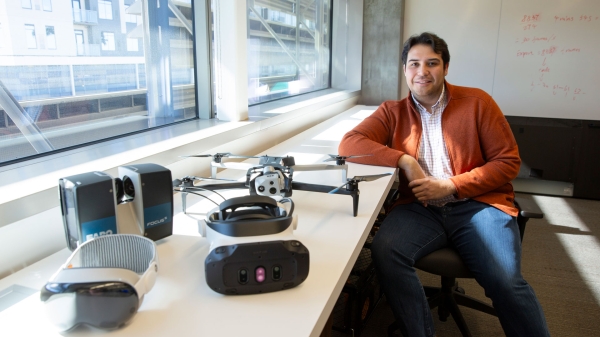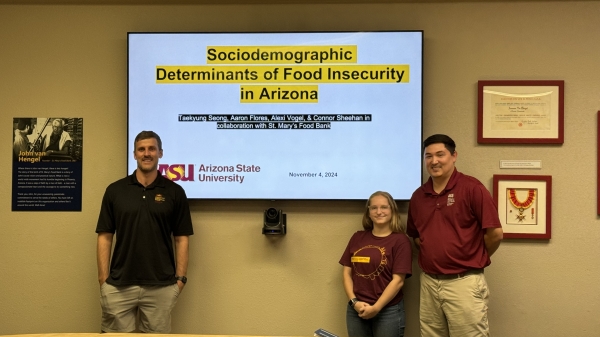ASU veteran and mental health advocate to address College of Integrative Sciences and Arts graduates

Shawn Banzhaf, assistant director of student success in the Pat Tillman Veterans Center at Arizona State University, will address College of Integrative Sciences and Arts graduates during convocation at 9 a.m. on Thursday, May 12, in Desert Financial Arena. Photo by Charlie Leight/ASU News
Shawn Banzhaf turned 50 earlier this year, and he said the milestone birthday has made him more reflective.
Banzhaf, assistant director of student success in the Pat Tillman Veterans Center at Arizona State University, has been thinking about all of his life experiences so far, and how he can use them to help others.
He thinks about legacies. He has a military legacy, following in the footsteps of his grandfathers and uncles. He has passed on a legacy of music to his grown children, one of whom is now a music teacher. What he really wants, though, is to leave the kind of legacy that will impact people for the better.
“I want to leave a legacy of love for the people that I come in contact with,” Banzhaf said. “What better legacy can I leave, really?”
Banzhaf will talk about love and more as the distinguished speaker at ASU’s College of Integrative Sciences and Arts convocation ceremony at 9 a.m. Thursday, May 12, in Desert Financial Arena.
About 500 of the college's more than 1,100 spring graduates will cross the stage during the ceremony, which the greater community is invited to attend.
College alum Andi Takenaga, who completed her bachelor’s degree in organizational leadership through the Starbucks College Achievement Plan two years ago, will present awards on behalf of the ASU Alumni Association: the 2022 Outstanding Graduate Award to Lisa Gutierrez (Master of Counseling) and Outstanding Undergraduate Award to Camille Unsworth (Bachelor of Science in applied biological sciences).
Twenty-one graduates are also being recognized with the ASU Alumni Association’s Moeur Award, completing all their credits at ASU in four years with a 4.0 GPA.
Former college dean Duane Roen, who’s retiring this month from ASU, will share a favorite poem with graduates.
Banzhaf is genuinely humbled by the opportunity to be a part of this ceremony.
“When I got that email from Dean Joanna Grabski, I thought maybe it was a mistake or something,” Banzhaf said with a chuckle. “It is such a big honor and I’m really honored that they would ask me.”
Associate Dean Manuel Aviles-Santiago, associate professor of languages and cultures, said Banzhaf’s humbleness and empathy make him a perfect choice for the role.
“In nominating a speaker for convocation, I put myself in the shoes of our students and asked myself what I thought they would want to hear. Coming from a challenging pandemic and considering the polarized world in which we live, I wanted to be sure whoever delivered the message was guided by intellectual curiosity, compassion and empathy,” said Aviles-Santiago, who also directs the college's Office for Veteran and Military Academic Engagement. “Shawn was the logical choice. He is an advocate for our students, a champion for our veteran community, a natural-born educator and an inspiring leader."
Lessons learned while healing from trauma
Banzhaf said he plans to talk about “the five L's,” one of which is love, in his speech, drawing from his book “The Five L's: A Practical Guide for Helping Loved Ones Heal After Trauma.”
He wrote the book to help people and their loved ones struggling with PTSD and suicide. Banzhaf, an Iraq war veteran, completed 100 combat missions with the 1074 Transportation Company and was awarded the Bronze Star for courage and a combat action badge.
“I'm proud of my service. I served with some great men and women,” said Banzhaf, a retired Army National Guard platoon sergeant. “We lost one soldier to combat, but I've lost four buddies to suicide since we've been home. The war just continues."
Banzhaf has had a passion for service throughout his life — he’s also been a pastor and a police officer, and now works with veteran students at the Pat Tillman Veterans Center. He said it’s been these experiences that led him to pursue a master’s degree in sociology. He’ll be an ASU graduate himself come December.
“I've seen all these different groups — military, higher education, religion, law enforcement. They're all of these microcosms within our macrocosm, but they all connect somehow, and that’s what led me to sociology,” Banzhaf said. “I like to call myself a lifelong learner.”
His military service also makes him a natural fit in his current role — helping student veterans — because he can empathize with a lot of their experiences.
“It was six days from my last combat mission where somebody is trying to kill me, until I was standing in my living room with my wife and kids. There is no decompression time,” said Banzhaf about what it’s like to leave the military so abruptly. “I understand what they're going through it, so it makes my job a little bit easier.”
Helping student veterans adjust to civilian life and learning to value themselves as individuals is an important part of what Banzhaf does at the center.
“I started asking student veterans, on a scale of one to 10, how would you rate yourself? 10 being a rock star and one, I don't really value myself,” Banzhaf said. “Of the 30 that I've asked that question to, the average is two or three. I had a couple of them say 0.5.”
That’s why Banzhaf has developed wellness programs for student veterans and helped bring the Treks for Vets program to ASU. Treks for Vets, coordinated by the college's Office for Veteran and Military Academic Engagement, is modeled after Huts for Vets, a wilderness therapy program for veterans in Colorado. The four-day retreat in the woods helps veterans reconnect to themselves and better prepare for reintegrating into civilian life.
Banzaf says that many people have experienced some kind of trauma, not just veterans, and that everyone needs to look internally at themselves and be honest about who they are and what they feel. He says that’s why choosing love can be scary if you aren’t ready to open yourself up.
“Love, it's one of the riskier things you can do, and so I’m trying to teach people how to be okay with that risk,” Banzhaf said. “To love across certain spaces, certain people, can be hard, so I think the safe thing is to practice with the people that you know.”
Banzhaf acknowledges that just because people choose love, doesn’t mean that relationships won’t have ups and downs or that you won’t come across difficult people. But he thinks that maybe it will help bring back some civility.
“It's small love gestures — acts of kindness across the space where maybe you disagree with someone wholeheartedly on a topic, but you can still show love,” Banzhaf said. “I can love you, regardless of how you view me.”
For Banzhaf, love is what brought him to where he is today in his life.
“I don't think I ever imagined doing what I'm doing right now. I think in my visions and dreams, I was just simply wanting to help people,” he said with a smile. “I guess I’m just a lover of people.”
More Science and technology

Teaching construction realities with virtual environments
Visiting a construction site is a valuable learning opportunity for students who want to one day work in the industry.…
ASU, Mexico partner to build next generation of chipmakers, drive semiconductor innovation
Thousands of college students in Mexico will soon have the opportunity to enroll in Arizona State University’s new, free online…

ASU, St. Mary’s Food Bank partner to tackle food insecurity in Arizona
Arizona State University and St. Mary’s Food Bank (SMFB) have joined forces to create an interactive data dashboard that tracks…